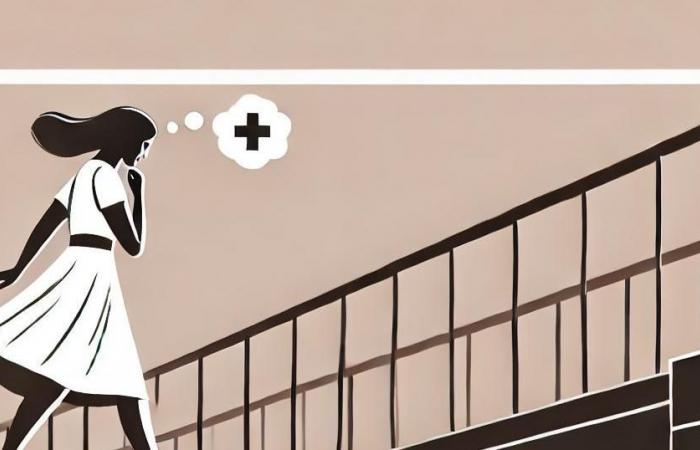Impulse phobia is an anxiety disorder classified as obsessive-compulsive disorder (OCD). It manifests itself through intrusive and recurring thoughts, often violent or immoral, which generate an intense fear of losing control and committing wrongdoing.
Impulse phobia affects approximately 2-3% of the population and can occur at any age, although this disorder is more common in young adults.
The imagined acts never happen and these thoughts do not reflect the real desires of the people involved. However, they cause great distress and a deep feeling of guilt.
Mara’s Challenges
In the podcast Dingue, Mara (pseudonym), 24, shares her difficulties: “If I walk on a bridge, my arms feel itchy, afraid that suddenly my hand will grab the railing and I’ll throws me over the bridge. It’s as if my limbs are guiding my body rather than my head.”
These are thoughts, but not desires, it’s something that scares me
The young woman also describes the fear of kissing someone in the middle of a conversation or of stabbing her husband in the kitchen.
Before the onset of her intrusive thoughts, Mara described herself as an anxious child: “Even as a child, I have memories where I felt like I had disappointed my mother and I didn’t sleep at night because of afraid that she won’t love me anymore.” Impulse phobia, closely linked to anxiety, tends to reinforce it: “They are thoughts, but not desires, it’s something that scares me,” she confirms.
The dizziness of love
If the origins of impulse phobia still remain unclear, Paolo Cordera, psychotherapist and coordinator of the specialized program for anxiety disorders and OCD at HUG, highlights a frequent triggering factor: maternity. “When the child is born, some women develop impulse phobias linked to their child. This is also very linked to the theme of responsibility.”
My family means a lot to me. For a very long time, I forbade myself from making mistakes or confronting them. I had to be the perfect girl
-
Simultaneously experiencing a strong emotional bond and total responsibility can trigger these phobias, which would be a – confusing – expression of a form of love. “The fact of loving someone, caring for them and caring for them can bring the idea of harming them or, in any case, the possibility of harming them,” adds Paolo Cordera.
Although Mara’s disorder is not linked to motherhood, this explanation resonates with her, as her phobias are often associated with her family. “My family means a lot to me. I forbade myself for a very long time from making mistakes or confronting them. I had to be the perfect daughter,” she confides.
Dissociating thought from action
The treatment of impulse phobias mainly relies on psychotherapy, sometimes combined with pharmacological treatment. Paolo Cordera specifies: “For anxiety disorders in general and OCD, we know that cognitive-behavioral therapy (CBT) provides a good success rate.”
I thought everything would be fixed in a year, but I realized it was taking longer
A key treatment process is the deconstruction of the “thought-action fusion”. “If I have a thought that tells me to do an action in my head, it’s like it’s the same thing as doing the action,” he explains. The objective is therefore to learn to dissociate these thoughts from any action, so that the person concerned understands that a thought remains a thought. It reflects neither a desire, nor an intention, nor his personality.
Mara’s recovery journey
After a short CBT, Mara’s psychologist offered her psychotrauma follow-up, her anxiety being – in part – linked to traumatic events. Mara plans a second phase of CBT afterward. She is patient: “I thought everything would be resolved in a year, but I realized it took more time and I am ready to give myself this time to get better.”
In the meantime, she lives with a “little superpower” often associated with impulse phobia: altruism. “I am very considerate of others. Everything I do is not for me, it is for others,” she concludes.
>> Also listen to the Madgue podcast on generalized anxiety disorders:
Adrien Zerbini/boi






